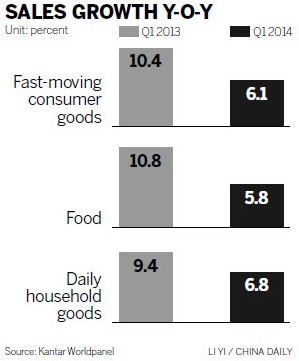

Govt anti-corruption campaign, consumer caution take their toll
Retail markets in the first quarter have seen growth slow to 6.1 percent compared with 10.4 percent a year ago, showing that consumers are getting more selective in their daily purchases and purchase volumes are staying stagnant, according to Kantar Worldpanel, a global market research institution.
The slowdown in the first quarter was primarily due to Chinese consumers' reluctance to spend as well as continued weakness in government and company spending on employee welfare, according to Jason Yu, general manager of Kantar Worldpanel China.
Despite continued strength of e-commerce channels, brick-and-mortar stores showed weaker numbers, and the slowdown was more obvious there, said Yu.
The report also said the trend is more noticeable in food rather than non-food categories, which still reported 6.8 percent growth year-on-year.
Juice and tea saw more than 20 percent value growth through reaching more consumers and raising prices, but carbonated soft drinks leveled off due to a stagnant consumer base, according to the survey.
Confectionaries showed strong growth, driven primarily by chocolate. "Compared to other categories, we continue to see strong demand of chocolate though we saw biscuits slow down," said Yu. Chocolate remained a quality choice for gifting during the holidays and continued to show double-digit growth. The category attracted more new buyers with their luxury premium offers.
Crispy snacks reversed a flat trend in 2013, recording 6.3 percent growth this year through expanding shopping occasions for consumers.
Biscuits' and cookies' strong growth during the traditional Lunar New Year was not extended. But key manufacturers like Kjeldsens, Mayora and Orion, which operate in premium biscuit segments, including gift cookies and innovative bite-size snacks, still are enjoying double-digit growth.
With the trend of Chinese traveling overseas during the holiday season continuing to boom, and dining out becoming more affordable thanks to the government's anti-corruption policy, cooking-related categories were adversely affected. Cooking categories declined by 6.6 percent as a result of weak performance in sesame oil and monosodium glutamate. But honey, oyster sauce and ketchup did well, according the report.
Premium products continue to prevail in higher-priced categories like oyster sauce and olive oil, though overall cooking oil performance was soft due to a reduction in company offers.
The retail market has recorded a slowdown mainly in top-tier cities, including Beijing, Shanghai, Chengdu and other provincial capital cities.
Yu said the fast-moving consumer goods categories were more saturated in key cities, where penetration of most categories hit a plateau. But there is still room to grow in lower-tier cities, he added.
The report forecast that for the rest of the year, growth in China's consumer goods market will slow as shoppers are expected to remain cautious about weakness in the macro-economy.
But with a growing middle class and greater disposable income, opportunities remain in 2014. Yu said publicity about consumer goods safety has lifted awareness of quality and safety to all-time highs. Tapping into consumers' unmet needs in this regard and creating a healthy image might help lift these categories grow against the downward tide.
The report predicts affordable goods purchases should rise as people reduce spending on luxury goods and fine dining.
China‘s April retail sales up 11.9 pct
2014-05-13Online sales lead retail sector: Ministry
2014-04-29China‘s Q1 retail sales up 12 pct
2014-04-16China‘s Jan-Feb retail sales up 11.8 pct
2014-03-13Retail sales up 13.1 pct in 2013
2014-01-20Copyright ©1999-2018
Chinanews.com. All rights reserved.
Reproduction in whole or in part without permission is prohibited.